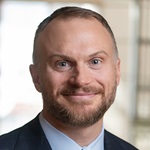Why Strokes Are Increasing Among Younger Adults

Answer a few questions and we'll provide you with a list of primary care providers that best fit your needs.
If you suffer a stroke, that means your brain is not receiving the blood supply it needs. There are two reasons this may occur:
- A blockage in an artery leading to your brain
- An artery to your brain has ruptured, causing the blood to leak elsewhere
Although the first reason is more common – about four out of five strokes are due to a blockage – the second reason, a ruptured artery is increasing in frequency, says Dr. Bryan Ludwig, a neuroendovascular and stroke neurologist. Its occurrence is especially growing among adults younger than age 65. “Both types of strokes are serious, causing disability, even death,” says Dr. Ludwig.
The Blood Pressure Connection
Dr. Ludwig, and researchers at the American Heart Association, blame unrecognized high blood pressure as a primary reason. “Younger adults may have high blood pressure and not know it because they don’t always visit their health care provider as often as they should,” says Dr. Ludwig. The stress and strain on your arteries caused by high blood pressure can trigger a bleeding stroke, also known as an intracerebral hemorrhage (ICH) stroke. “While the arteries leading to your brain are robust, they have their limits. If you have high blood pressure and it’s not being treated, you’re putting these arteries under continuous strain and stress, and they begin to wear out. Over time, these weakened arteries can expand and rupture, and that’s what happens in this type of stroke.”
What Else Increases the Risk of ICH?
In addition to uncontrolled high blood pressure, Dr. Ludwig explains that the risk of an ICH is elevated among people who:
- Smoke
- Abuse drugs
- Drink alcohol heavily
- Have a family history of ICH
Lower on the list, but still having an increased risk, are people with high cholesterol, uncontrolled diabetes, poor diet, and/or lack of routine exercise, says Dr. Ludwig.
American Heart Association researchers cautioned that if these risk factors aren’t monitored during young adulthood, vascular damage can occur as young as your 40s and 50s.
Steps To Avoid Stroke
In order to effectively monitor yourself for risk factors of stroke, Dr. Ludwig recommends visiting your health care provider yearly or as often as your provider suggests. “If you are at risk, your health care provider can help you reduce your risk through lifestyle changes and medication,” he says. “And if you have high blood pressure, check it often so you know how you’re doing. If the numbers get too high, seek medical care right away.”
Answer a few questions and we'll provide you with a list of primary care providers that best fit your needs.
Source: Bryan Ludwig, MD, Clinical Neuroscience Institute; American Heart Association





